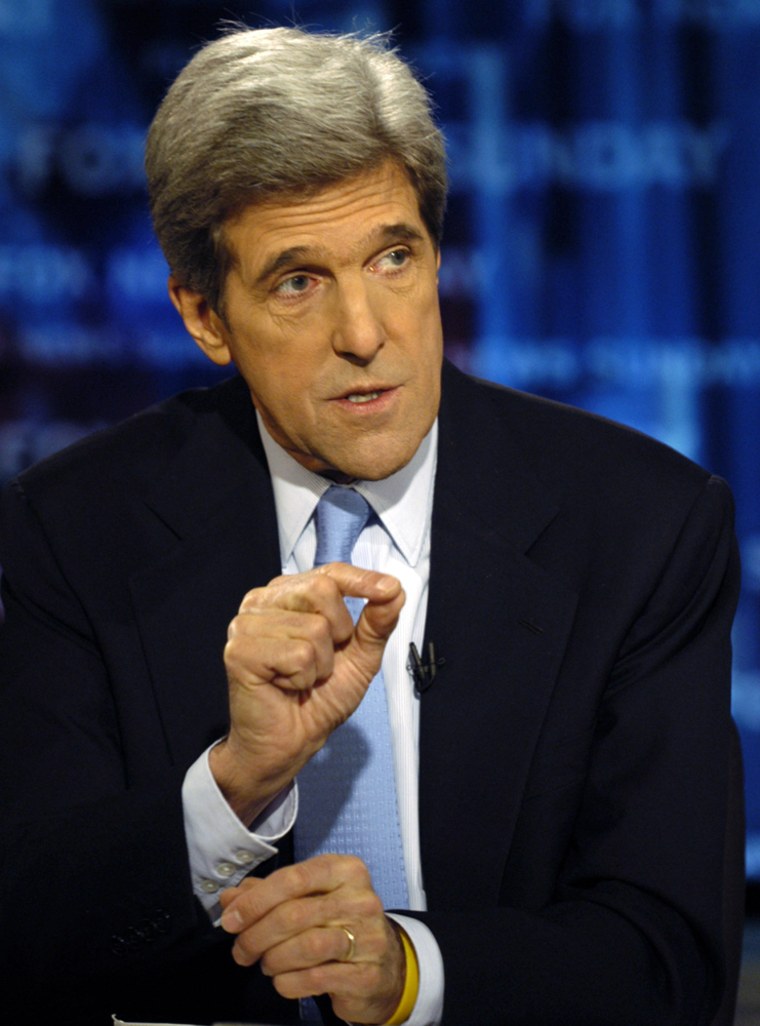Massachusetts Democratic Sen. John Kerry said Sunday he is still considering a second run for the White House in 2008, despite public criticism of what he has has called a “botched joke” about the Iraq war.
In an interview on “Fox News Sunday,” Kerry was asked he had given up on a presidential run after the flap over his comment to students that they could “get stuck in Iraq” if they did not study hard enough.
“Not in the least. I am looking at it in the same way. The people that I have talked to across the country, my team’s confident and strong. I don’t know what I’ll do.
“I’ve apologized and we have to move on to the real issues that face this country.”
Kerry had apologized to U.S. troops for his remarks, and said his comments were aimed at President Bush’s handling of the war in Iraq.
Still Kerry, who lost to Bush in the 2004 presidential race, drew a firestorm of Republican criticism and riled fellow Democrats in the last days of the midterm congressional campaigns. He was forced to cancel campaign appearances on behalf of Democratic candidates.
Democrats reclaimed control in the Nov. 7 elections of both the House and Senate for the first time in 12 years, prompting speculation by political analysts Kerry’s own presidential bid was the biggest casualty of his remarks.
Unlike some potential contenders who recently took the initial formal steps to start raising money for their 2008 presidential race, Kerry said he would defer his decision for a bit longer.
“I’ve said this all along, my decision would be somewhere around the turn of the year, the beginning of the year.”
“Right now, my focus will be what happened on election day,” he said, citing a need to work toward solutions on Iraq, energy independence and health care. “The American people are waiting for us to lift up an enormous challenge.”
Both Kerry and Gingrich appeared on “Fox News Sunday.” McCain was on “This Week” on ABC.
Buzz surrounds other likely candidates
If Kerry enters the race he will be joining about a dozen others of both parties are expected to start vying for the White House over the next several months. For Democrats, New York Sen. Hillary Rodham Clinton, said to be considering a run, has been the early leader in the polls.
One of the GOP politicians mentioned in a crowded field for the White House, former House Speaker Newt Gingrich, said he would not make a decision until September—a relatively late date in the campaign cycle—to focus in the private sector on trade policies.
“We have lots of time for personal ambition,” the Georgia Republican said. “And I think an awful lot of this early energy is wasted, and we ought to be focusing on, you know, how are you going to compete with China and India, how are you going to solve the problem in Iraq?”
Gingrich said Arizona Sen. John McCain and former New York mayor Rudy Giuliani, both of whom have set up presidential exploratory committees, were the likely GOP front-runners. But Gingrich said voters are yearning for a clearer conservative voice.
“I think Mitt Romney has an opportunity to fill that,” Gingrich said, referring to the outgoing Massachusetts governor.
McCain said Giuliani was an “American hero” for his leadership in New York following the Sept. 11, 2001, attacks. But McCain called himself the best presidential candidate based on a “record of being a conservative Republican, of knowledge on national security and defense issues.”
McCain, who supports a ban on abortion except in cases of rape, incest and to save a mother’s life, said he doubted a constitutional amendment could pass but that one would not be needed because “it’s very likely or possible that the Supreme Court should—could—overturn Roe v. Wade.”
Abortion as an issue
The high court is deciding this term whether to uphold a 2003 federal law banning the procedure opponents call “partial-birth” abortion. It is a case that conservatives hope could be used to reverse the landmark 1973 decision that made abortion a constitutional right.
At least two conservatives, Justices Antonin Scalia and Clarence Thomas, have called on Roe to be overturned. Legal analysts have said if the court issues an anti-abortion ruling, justices would be more likely to impose restrictions rather than abolish the right.
“I’m a federalist,” McCain said. “Just as I believe that the issue of gay marriage should be decided by the states, so do I believe that we would be better off by having Roe v. Wade return to the states. And I don’t believe the Supreme Court should be legislating in the way that they did on Roe v. Wade.”
McCain called the military’s “don’t ask, don’t tell” policy toward gays “very effective.” He said he opposed gay marriage, but as to civil unions, “people ought to be able to enter into contracts, exchange powers of attorney, other ways that people who have relationship can enter into.”
Edwards burnishes image
Meanwhile, former Democratic vice presidential candidate John Edwards was in Columbia, S.C., to promote a new book he edited on childhood homes, “Home: The Blueprints of Our Lives.” He touted his proposals to reform education, promote universal health care and pull troops out of Iraq.
“The single largest responsibility for the next president is to take a leadership role in the world,” said the former North Carolina senator, who ran with Kerry in 2004. “In order for that to happen, we need to re-establish ourselves as moral leaders.”
Edwards hasn’t formally decided on whether to seek the presidency, but he has been traveling the country promoting programs to combat poverty. His book tour also has stopped in Iowa, New Hampshire and Nevada — all key states in the presidential nominating process.
